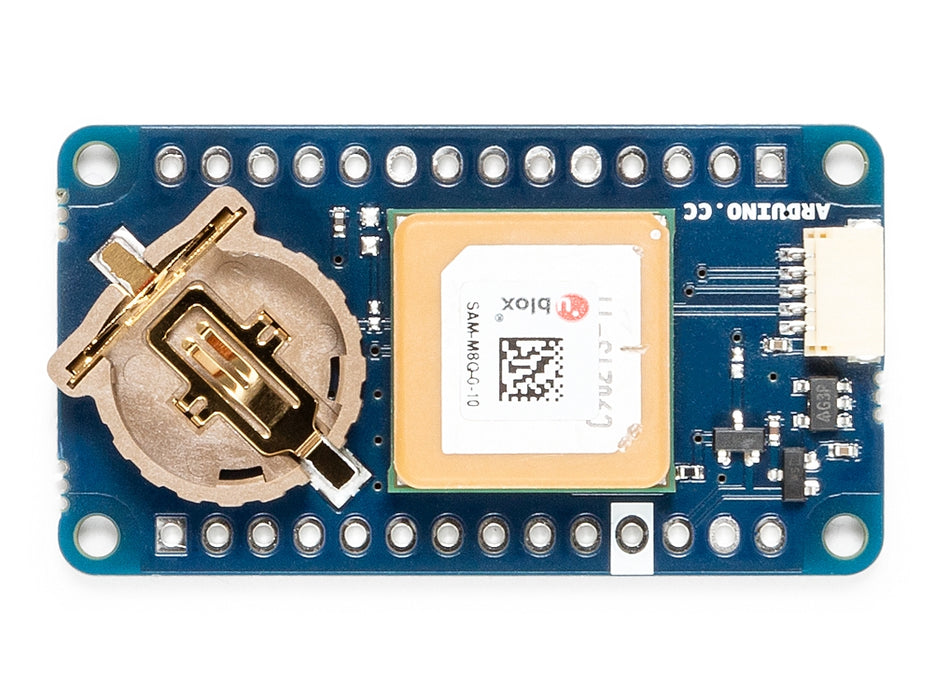
Overview
If you are experimenting with monitoring fleets, high-altitude scientific experiments, or any kind of project requiring localization of devices, the MKR GPS Shield will offer you the functionality you need, and it is plug 'n' play!
The MKR GPS Shield is based on the u-blox SAM-M8Q GNSS (Global Navigation Satellite System) module. It is meant to be used on top of boards in the MKR format, but thanks to its Eslov connector, it is also possible to hook it up to any board having that kind of connector available using a cable.
This module is designed to operate with different positioning services concurrently. It receives and processes the signals from GPS, GLONASS, and Galileo. It interfaces with Arduino boards either through a serial interface, when used with headers and put on top of a MKR board, or through an I2C interface and a dedicated ESLOV cable supplied as bundle.
Configuration Commands and Backup
The GPS module can be configured via special commands. We have included an on-board battery holder for the system to keep the configurations made via software. This can be convenient when e.g. changing the operation mode of the GPS to 1g, something common in high altitude experiments, where specific settings away from the default ones are needed for the device.
Another example is the use of Galileo's localization option, which is disabled by default, but can be enabled by sending a configuration message (UBXCFG-GNSS) to the receiver. You can find a detailed description of all of the commands in the protocol here.
Getting Started
Our Arduino_MKRGPS library handles the two different interfaces and offer a consistent set of APIs designed for a full usage of the GPS acquired information
Need Help?
Check the Arduino Forum for questions about the Arduino Language, or how to make your own Projects with Arduino. Need any help with your board please get in touch with the official Arduino User Support as explained in our Contact Us page.
Warranty
You can find here your board warranty information.
Tech specs
| GNSS receiver | u-blox module SAM-M8Q (datasheet) |
| Connectors | MKR headers / Eslov |
| Input Voltage | 3.3V |
| Operating Voltage | 3.3V |
| Backup battery | CR1216 |
| Communication | Serial / I2C / DCC |
| Length | 45 mm |
| Width | 25 mm |
| Weight | 14 gr. |
Conformities
Resources for Safety and Products
Manufacturer Information
The production information includes the address and related details of the product manufacturer.
Arduino S.r.l.
Via Andrea Appiani, 25
Monza, MB, IT, 20900
https://www.arduino.cc/
Responsible Person in the EU
An EU-based economic operator who ensures the product's compliance with the required regulations.
Arduino S.r.l.
Via Andrea Appiani, 25
Monza, MB, IT, 20900
Phone: +39 0113157477
Email: support@arduino.cc
Documentation
OSH: Schematics
The Arduino MKR GPS Shield is open-source hardware! You can build your own board using the following files:
EAGLE FILES IN .ZIP SCHEMATICS IN .PDF
Additional I2C Port
The MKR GPS Shield has an additional connector meant as an extension of the I2C bus. It's a small form factor 5-pin connector with 1.0 mm pitch. The mechanical details of the connector can be found in the connector's datasheet.
The I2C port, also referred to as the Eslov self-identification port within Arduino, comes with: SDA, SCL, GND, +5V, and an extra digital pin meant to send an alarm to the otherwise plain I2C devices connected to it. The pinout is shown in the following image:
If you are interested in designing your own modules for Arduino boards with this expansion port, the connector we suggest using is code: SHR-05V-S-B, also in the picture.
Learn more
Get Inspired

A smart coop with four-way door and cleaner can be scheduled at specific time from remote command.

Arduino is excited to announce a strategic new partnership with RS/OKdo, a prominent leader in the distribution of industrial and electronic equipment. This collaboration marks a significant step forward in bringing Arduino’s technology closer to China’s thriving maker community and enterprise sector, offering enhanced local support and access to original Arduino boards and resources. Empowering a growing community in China With over 2.7 million active users of the Arduino IDE in China, one of our top priorities is to deliver an even better experience for the Arduino Community. This partnership with RS/OKdo means users will enjoy more local language content, technical support, competitive pricing, and most importantly, easier access to official Arduino products. Official Arduino boards, certified for China As part of this initiative, a range of classic and most popular Arduino boards has been specifically manufactured for the Chinese market. These boards are exactly the same as Arduino’s global versions of the same products, produced in Italy to Arduino’s highest standards, tested rigorously for quality and performance. Each product , although certified exclusively for the Chinese market, matches the same technical specifications and high-quality benchmarks as those sold worldwide. The boards are available only through RS/OKdo and Arduino/OKdo’s authorized sub-distributors. They have unique Arduino MPNs but with a _CN suffix: Arduino UNO R4 Wifi (ABX00087_CN) Arduino UNO R4 Minima (ABX00080_CN) Arduino UNO R3 (A000066_CN) Arduino Nano ESP32 with (ABX00083_CN) and without (ABX00092_CN) headers Arduino Nano R3 (A000005_CN) Arduino Mega 2560 (A000067_CN) Arduino DUE (A000062_CN) Front & back of official UNO R4 WiFi - SKU ABX00087_CN Front & back of official UNO R3 - SKU A000066_CN Expanding local support for enterprise transformation In addition to supporting makers, RS/OKdo will provide enhanced









